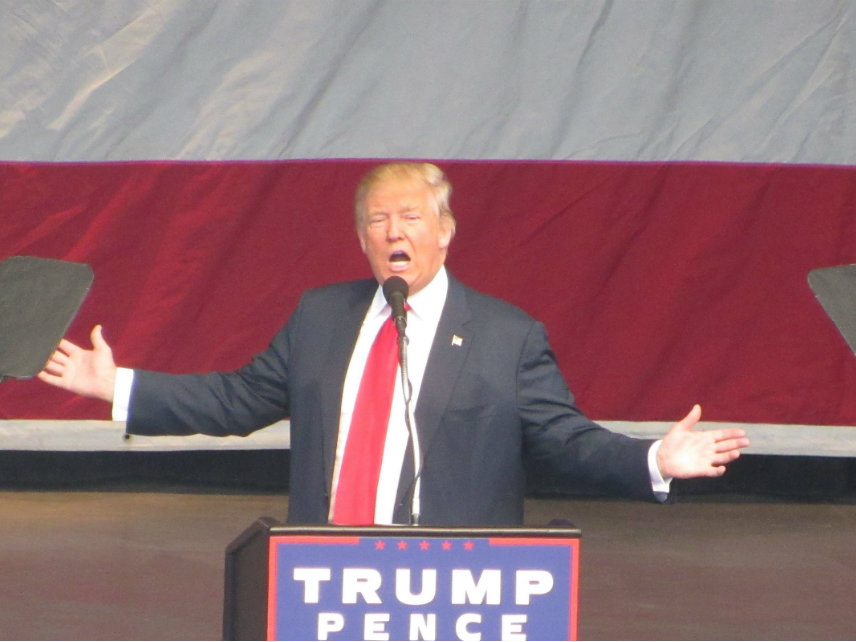Judge: Trump Administration's Steel Tariff Rationale 'Makes Me Scratch My Head'
The Trump administration's response to a lawsuit challenging steel tariffs is a deeply un-conservative argument for greater executive power.

Unofficially, President Donal Trump's tariffs are about a lot of things. They're the result of the president's faulty understanding of how trade works, of his desire to be a "Tariff Man," and of the administration's political interests in protecting American steelmakers—even at the expense of the far larger pool of American manuacturers who have been hurt by artifically higher steel prices.
Officially, however, President Donald Trump's tariffs on imported steel and aluminum are simply about bolstering America's national defense. As Commerce Secretary Wilbur Ross explained when the tariffs were announced in March 2018, they are necessary to ensure America has a sufficient supply of steel (and aluminum) in the event international supplies are cut off by war or other calamity.
That official, legal, rationale for the tariffs was all that mattered Wednesday when Justice Department lawyers appeared before the U.S. Court for International Trade to defend the tariffs against a lawsuit brought by steel importers, who say the president has overstepped his authority.
But if the tariffs are necessary for America's national defense, why did Defense Secretary Jim Mattis—who was consulted by the Commerce Department—say that's not the case? "I scratch my head a little bit about the rationality of a presidential action which ignores that," Judge Gary Katzmann told the Trump administration's lawyers during the oral arguments, The Wall Street Journal reports.
According to the Journal, government lawyers "sought to distinguish between national defense in the narrow sense and economic wellbeing as a broader aspect of national security" during Wednesday's arguments. In other words, the Trump administration is asking the court to rule that the executive branch can deem anything it wants as vital to the nation's security.
This is a deeply un-conservative argument coming from a Republican administration. It's also one that effectively expands the executive branch's authority to cover any aspect of the economy—one that doesn't even really require a national security justification at all, if the flimsy one constructed by the Trump administration is allowed to pass muster. At its core, it's an argument that says the president's opinion is law.
All this talk about national security justifications for tariffs comes from Section 232 of the Trade Expansion Act of 1962, in which Congress deferred a portion of its constitutional powers to regulate trade and foreign commerce to the president. The Supreme Court upheld the executive branch's authority to use Section 232 for national security reasons in a 1976 case challenging a series of oil import quotas.
But that case, Federal Energy Administration v. Algonquin, arguably had a closer link to actual national security issues and was decided in a narrow way. Trump's sweeping use of Section 232 is unprecedented—though, as the Journal notes, the U.S. Court of International Trade may be bound by that ruling. If so, the importers bringing the lawsuit say they will appeal to the Supreme Court.
As the plaintiffs in the tariff case argue, if the president is allowed to impose tariffs for such vaguely defined reasons, "there is nothing he cannot do through tariffs, quotas, and similar remedies to bring about whatever result he thinks desirable, for any reason whatsoever." And if the court buys the government's argument for a broad reading of "national security" and upholds Trump's tariffs, it will effectively be signing off on limitless executive power in the realm of economic policymaking.
Editor's Note: As of February 29, 2024, commenting privileges on reason.com posts are limited to Reason Plus subscribers. Past commenters are grandfathered in for a temporary period. Subscribe here to preserve your ability to comment. Your Reason Plus subscription also gives you an ad-free version of reason.com, along with full access to the digital edition and archives of Reason magazine. We request that comments be civil and on-topic. We do not moderate or assume any responsibility for comments, which are owned by the readers who post them. Comments do not represent the views of reason.com or Reason Foundation. We reserve the right to delete any comment and ban commenters for any reason at any time. Comments may only be edited within 5 minutes of posting. Report abuses.
Please to post comments


Trump's tariff's are about appealing to middle American pro-union Democrats more than it's about trade in my view. Democrats bailed on that constituency in favor of more balkanized racial and sexual grievance groups and are basically there for the taking, even if it's disastrous.
Sounds like someone probably can barely even play one-dimensional chess.
Well, he does have a pen and a phone, so......
We're all raging populists now.
Unofficially, President Donal Trump's tariffs are about a lot of things. They're the result of the president's faulty understanding of how trade works, of his desire to be a "Tariff Man," and of the administration's political interests in protecting American steelmakers?even at the expense of the far larger pool of American manuacturers who have been hurt by artifically higher steel prices.
Poor lying Boehm. He knows that another unofficial reason for Trump tariffs is to get our trading partners to lower their trade restrictions.
Which is still not working. How long do we have to suffer so that Trump can make things better for a few politically connected cronies?
Thanks admin for giving such valuable information through your article . Your article is much more similar to https://www.moschinooutletonlinestore.com/ word unscramble tool because it also provides a lot of knowledge of vocabulary new words with its meanings.